Founded by Genghis Khan in 1220 it served as the capitol of the Mongol empire until 1388 when it was destroyed by the Chinese.
In the early 1500's it was rebuilt and served again as the capitol but was eventually abandoned.
In 1585 the Erdene Zuu Buddhist monastery was built on the spot surrounded by an imposing wall 400 meters on a side.
It can be seen in the distance in this picture.
In 1939 a Mongolian Communist leader had the monastery destroyed except for the wall and a few of the structures which were converted to museums.
In 1990, the monastery was returned to Buddhist lamas and Erdene Zuu was once again a place of worship and study.
Just inside the gate is this monument inscribed in Mongolian, Chinese, Tibetan, and Arabic scripts
You can see the marks on it where visitors have touched it.
Most of the architecture had a heavy Chinese influence.
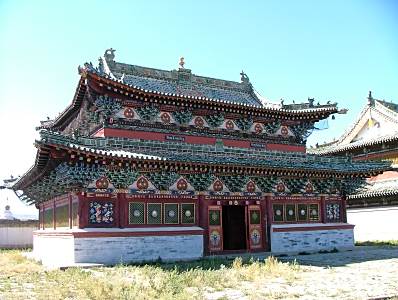
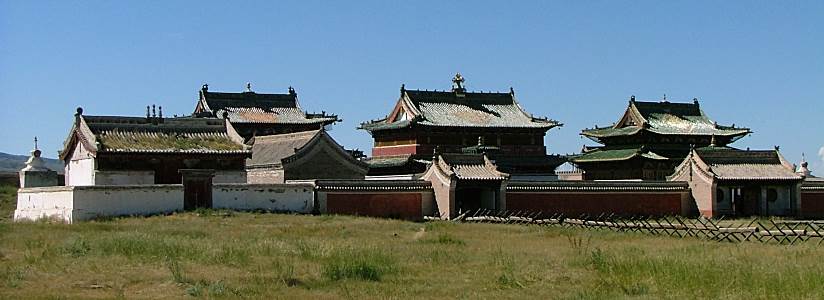
One of them in the style of Tibetan Buddhist buildings.
Some of it seemed to be a blend.
In the compound there were several structures that looked like the stupas we saw when we visited Tibet.
Within the buildings were sculptures and paintings.
Many of them depicted/honored Buddha
There were geometric forms.
This one had the symbol that is also seen on the flag and throughout the country.
An elaborate model was displayed.
Strange and scary figures were often the subject.
Consider the mental state of the person who first imagined these.
Monks were walking on the grounds.
They had probably just come from study or worship.
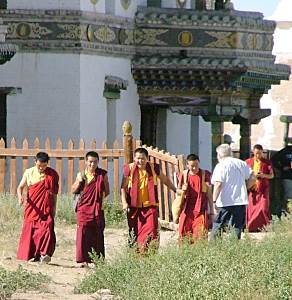
This turtle sculpture is said to have been one of four that marked the boundaries of the original city.
Only two of them have been discovered so far.
A sculpture created to hold the carnal impulses of the monks and encourage their good behavior
More recently it has become a charm thought by many to be instilled with the power to overcome infertility.
One of the many places where souvenirs were available or, if the vendors are to be believed, artifacts.
Folks in historic garb posed for pictures.
One of the tracks that pass for roads that we traveled on.
For a more complete description see the web page on the Hustain Nuruu Reserve
There are paved roads but that doesn't make them any more likely to be free of herds of horses, cattle, camels, goats or in this case sheep.
The steep transition from a dirt to a paved road probably was what was responsible for this load of wool shifting.
Fortunately the construction crew were on hand to help straighten it.
Throughout the country you will find piles of stones like these topped with scarves.
Travelers add a stone or scarf , walk around it, or if you are like our drivers just beep three times.
Black vultures were picking at a carcass of a cow along the road.
Antelope
The Mongolian road rally was in full swing with some competitors having driven from Europe to participate.
This one was just leaving a checkpoint near our next stop.
Our next camp had these extraordinary gers where we dined.
Yes, that is a crystal chandelier.
Some of the group took another camel ride, others took in some of the local sights, or did some bird watching, while the rest just hung out at the camp.
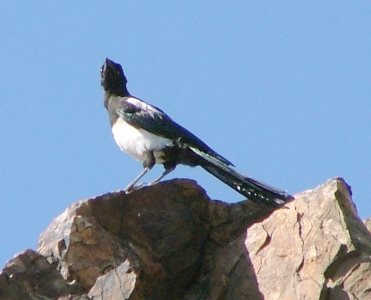
We had enjoyed dumplings at several stops on our trip.
When we were here someone had the idea of asking for a lesson in how to make them.
The cook seemed surprised but was happy to show us.
Our driver was a wizard making the dough circles and our guide also really got into the fun showing us a variety of shapes that we could copy, or try to.
Nearly everyone tried their hand at it though some required considerable coaxing.
You know who you are.
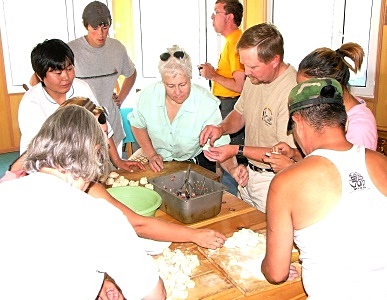
Some of the products.
The recipe is simple: a dough of white flour and water, divide into small lumps and roll them into circles with a thicker spot at the center.
The rolling process has to be seen, I really can't describe it.
The filling is ground meat (your choice), chopped onions, garlic, and salt.
A spoonful of the filling is placed on one of the dough circles then you fold it artistically and put it on an oiled pan until ready to put it into the steamer to cook.
A fitting end to our day.
Many thanks to our friends from the trip for sharing their good company, videos, and pictures with us and with you.
Thanks again Alice, Lee, Eleanor, Michael, Joyce, David, Juliana, Tom, Stu, and Tanner.